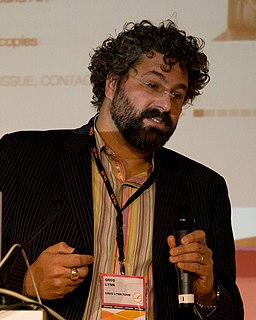A Quote by Greg Lynn
It turns out it's not rocket science to design a sacred space.
Quote Topics
Related Quotes
With space travel, [it's] no different. You know, in 1990 I read the name Virgin Galactic Airways. Loved the name. And set out to try to find an engineer or rocket scientist in the world who could build a safe, reusable rocket that could take people to and from space and we could start a whole new era of commercial space travel.
When we think of design, we usually imagine things that are chosen because they are designed. Vases or comic books or architecture... It turns out, though, that most of what we make or design is actually aimed at a public that is there for something else. The design is important, but the design is not the point. Call it "public design"... Public design is for individuals who have to fill out our tax form, interact with our website or check into our hotel room despite the way it's designed, not because of it.
For me, a rocket is only a means--only a method of reaching the depths of space--and not an end in itself... There's no doubt that it's very important to have rocket ships since they will help mankind to settle elsewhere in the universe. But what I'm working for is this resettling... The whole idea is to move away from the Earth to settlements in space.
Indeed the early history of rocket design could be read as the simple desire to get the rocket to function long enough to give an opportunity to discover where the failure occurred. Most early debacles were so benighted that rocket engineers could have been forgiven for daubing the blood of a virgin goat on the orifice of the firing chamber.
The expense of getting into space is the rocket launch, the rocket itself. Rocket's right now, commercial rockets cost probably somewhere between $50, or $120, or $150 million per launch. And those are all expendable. That is, you've got to buy a new rocket for each launch. So, that really is the critical part. If there was some kind of really, a revolutionary breakthrough and the price of rockets fell by an order of magnitude, I mean, just imagine what that would do as far as getting access to more ordinary people.
But as Van casually directed the searchlight of backthought into that maze of the past where the mirror-lined narrow paths not only took different turns, but used different levels (as a mule-drawn cart passes under the arch of a viaduct along which a motor skims by), he found himself tackling, in still vague and idle fashion, the science that was to obsess his mature years - problems of space and time, space versus time, time-twisted space, space as time, time as space - and space breaking away from time, in the final tragic triumph of human cogitation: I am because I die.
The conclusion of intelligent design flows naturally from the data itself - not from sacred books or sectarian beliefs. Inferring that biochemical systems were designed by an intelligent agent is a humdrum process that requires no new principles of logic or science. It comes simply from the hard work that biochemistry has done over the past forty years, combined with consideration of the way in which we reach conclusions of design every day.








































